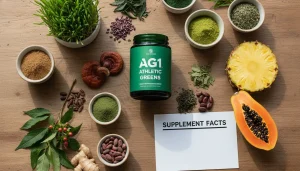Endorsed by high-profile figures like Joe Rogan and recommended by longevity enthusiasts such as Andrew Huberman and Peter Attia, the AG1 supplement has generated significant attention in the health and wellness community. At roughly $100 per month, it markets itself as a comprehensive solution to improve energy, enhance focus, support digestive health, and boost your immune system. But beyond the hype and celebrity endorsements, is AG1 truly effective, or is it just another trendy green powder riding on social media buzz?
I’ve personally tested AG1 for several weeks, dug into the research, and examined expert opinions to provide a thorough, practical perspective. In this review, I’ll break down not just what AG1 contains, but how it works in daily life, potential benefits, limitations, risks, and whether it’s worth your time and money.

Many people wonder: Is this just a supplement for the health-conscious Instagram crowd, or can it genuinely fill nutritional gaps for busy professionals, travelers, and anyone with inconsistent diets? My goal is to answer that question clearly and give you an honest, no-nonsense view.
What You’ll Learn in This Article
- What AG1 actually is and who should consider it
- A detailed look at the ingredients and their potential benefits
- The science behind the claims and expert opinions
- Risks, side effects, and controversies you should be aware of
- How AG1 compares to other popular green powders
- My personal experience and verdict
What Is AG1?
AG1, formerly called Athletic Greens, is a powdered supplement designed to provide a wide array of nutrients in a single daily serving. It contains over 70 ingredients, ranging from vitamins and minerals to probiotics, plant extracts, and adaptogens. The brand markets it as a comprehensive solution to fill nutritional gaps, boost energy, support digestion, and strengthen the immune system.

Each scoop has around 41 calories, 2.5 grams of fiber, and 2.6 grams of protein — not exactly a full meal replacement, but enough to supplement your daily intake. Personally, I mix it with cold water on an empty stomach in the morning. It’s quick, convenient, and somehow makes me feel like I’m starting the day on the right note, even if my coffee habit later betrays me.
AG1 Ingredients Breakdown
The AG1 supplement includes four main ingredient categories:
- Vitamins & Minerals – Vitamin A, B-complex vitamins, C, E, calcium, magnesium, selenium, and zinc.
- Superfoods & Plant Extracts – Spirulina, chlorella, reishi mushrooms, shiitake mushrooms, ginger, bilberry, and cocoa bean.
- Probiotics – Strains like Lactobacillus acidophilus and Bifidobacterium lactis to support gut health.
- Natural Compounds – Alpha-lipoic acid, CoQ10, choline, and inositol.
AG1 is free from artificial sweeteners, colors, flavors, gluten, dairy, soy, lactose, eggs, and peanuts. The supplement is also third-party tested for heavy metals, pesticides, and allergens, which gives a degree of assurance about safety.
However, there’s a notable downside: proprietary blends. This means the exact amounts of each ingredient aren’t disclosed. While I trust the company to some extent, not knowing precise quantities makes it difficult to evaluate both effectiveness and potential risks.
The Science Behind AG1
The research on AG1 specifically is limited. Many studies cited by the brand are small or lab-based, which makes drawing definitive conclusions tricky. Here’s a quick overview:
- A 2024 study with 30 participants suggested increases in gut-friendly bacteria such as Lactobacillus acidophilus and Bifidobacterium bifidum after four weeks of AG1 consumption.
- A 2025 study involving 120 adults following the Standard American Diet showed increased vitamin C and folate levels and decreased homocysteine — a marker linked to heart disease risk.
- Another lab study assessed the bioaccessibility of magnesium, zinc, calcium, and potassium in AG1 and found positive results, though lab conditions don’t always translate perfectly to humans.
In short, AG1 might help fill nutrient gaps, especially for those with limited access to fresh produce or a hectic schedule, but it’s not a magic solution. I consider it a supplement that can enhance consistency in your nutrition rather than replace wholesome meals.
Potential Benefits
From my experience and research, the main benefits of AG1 include:
- Digestive Support: The probiotics and fiber can improve gut function, though results vary individually.
- Energy & Focus: B vitamins and plant extracts may contribute to clearer thinking and reduced fatigue.
- Immune Support: Vitamins C, zinc, and other antioxidants assist the body’s natural defenses.
- Nutritional Gap Filling: Convenient for those skipping vegetables or other nutrient-rich foods.
If your diet already includes plenty of fruits and vegetables, these benefits may be less noticeable. Think of AG1 as a “top-up” rather than a replacement for solid meals.
Risks and Controversies
AG1 has faced criticism in the past. In 2022, ConsumerLab detected small amounts of lead, posing potential risks for children and pregnant women. The company reformulated the product, but the incident highlights the importance of third-party testing.
Other concerns include:
- Excessive B12: A single scoop contains 50 mg of vitamin B12, roughly 20 times the recommended daily intake. While water-soluble vitamins like B12 are usually safe, excessive intake can trigger acne or skin irritation in some individuals.
- Drug Interactions: Ingredients like reishi mushrooms may lower blood pressure or interact with anticoagulants. Shiitake mushrooms can cause dermatitis in sensitive individuals.
- Proprietary Blends: Lack of full disclosure prevents users from knowing exact dosages and potential overconsumption.
Experts like Melissa Boufounos note that while AG1 can support nutrition, it should not replace whole foods. Dan Jackowiak warns that multi-ingredient powders can sometimes stress the liver or gut due to complex compositions.
AG1 vs Other Green Powders
AG1 is often compared to other popular options such as Bloom, Organifi, and Huel Greens. Here’s a quick comparison:
| Brand | Monthly Cost | Ingredients | Key Benefits |
| AG1 | ~$100 | 70+ | Energy, immunity, digestion |
| Bloom | ~$40 | 30+ | Skin, gut, bloating |
| Organifi | ~$70 | 40+ | Stress, detox, recovery |
AG1’s extensive ingredient list and celebrity endorsements give it an edge, but the price is significantly higher. If you’re on a budget, other greens powders may offer similar benefits at a lower cost.
For more insights on supplement comparisons, check my guide on nutrition strategies for busy lifestyles.
How to Take AG1
For optimal results, mix one scoop with cold water and consume it first thing in the morning. Avoid hot liquids, as heat can degrade certain vitamins, and try not to drink it immediately with coffee, which may affect absorption.
Some people like to add lemon or ice to improve taste. I personally stick to plain water — the grassy vanilla flavour is manageable once you get used to it.
My Experience
After using AG1 for several weeks, I noticed:
- Slightly improved focus in the mornings
- Less mid-day fatigue
- More consistent energy levels
However, it’s hard to determine whether these changes were due to AG1 or simply being more mindful of my hydration and diet. Convenience is a major win — no chopping, blending, or clean-up. But at $100 a month, I expected more dramatic results.
Verdict
AG1 supplement is beneficial for:
- People with hectic schedules
- Those with limited access to fresh fruits and vegetables
- Anyone seeking a convenient nutrient boost
It is not essential for those already eating a balanced diet. It also carries potential risks for sensitive individuals or those on medications.
Personally, I see it as a helpful addition, not a miracle product. If it keeps you consistent with your nutrition, it’s worth considering. Otherwise, investing in whole foods may provide equal or greater benefit at a lower cost.
Tips for Choosing a Greens Powder
If you’re considering AG1 or similar products:
- Check for third-party testing for contaminants
- Review the ingredient list carefully
- Consider cost vs. actual nutritional benefit
- Start with a small trial to gauge tolerance and effectiveness
Final Thoughts
The AG1 supplement offers convenience, a broad nutrient profile, and some potential health benefits. But it’s not a replacement for whole foods, nor is it guaranteed to dramatically improve energy or immunity. For those with busy lifestyles or limited diets, it can be a useful tool.
My bottom line: use it wisely, don’t rely on it as a shortcut, and always consult a healthcare professional if you’re taking medications or have specific health conditions.
In the end, no supplement beats real food — but AG1 can give you a small, reliable boost when your schedule gets the better of you.
Frequently Asked Questions About AG1 Supplement
Q1: Can I replace my meals with AG1?
A1: No, AG1 is a supplement to fill nutrient gaps, not a meal replacement.
Q2: Who should avoid AG1?
A2: Pregnant, breastfeeding, or medication-sensitive individuals should consult a doctor first.
Q3: How should I take AG1 for best results?
A3: Mix one scoop with cold water on an empty stomach, ideally in the morning. Avoid hot liquids or immediate coffee.
